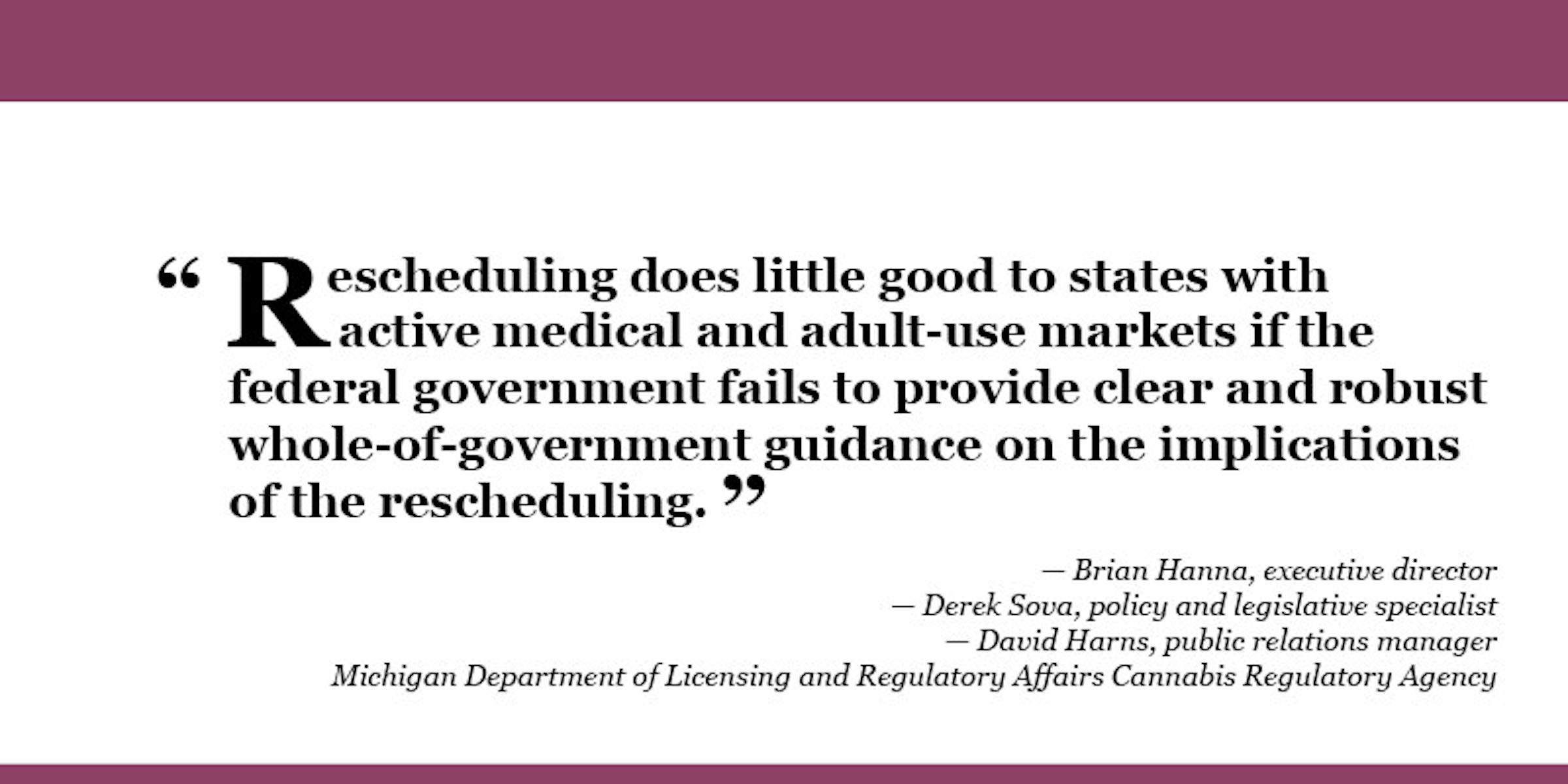'A meaningful, paradigm altering change'
More than 43,000, including Michigan regulatory agency, comment on proposed shift in cannabis classification
Michigan’s top cannabis regulatory agency this week called on the federal government to take advantage of a “once in a generation opportunity to make a meaningful, paradigm altering change in how marijuana is viewed in this country.”
But in a July 22 memorandum to the U.S. Drug Enforcement Administration, Michigan Cannabis Regulatory Agency (CRA) Executive Director Brian Hanna, Policy and Legislative Specialist Derek Sova and Public Relations Manager David Harns warned that the change must not happen in a vacuum.
The nine-page memo was among more than 43,000 comments the DEA received between May 21 and Monday’s deadline in response to a proposal to reclassify cannabis containing THC – better known as marijuana – from a highly regulated Schedule I controlled substances to a lesser-controlled Schedule III.
“For more than a half-century, efforts to change how the federal government views marijuana and treats those who grow and consume it fell on deaf ears,” the CRA leadership wrote. “In the absence of federal action, states took it upon themselves to gain knowledge and expertise and to build robust regulatory programs that ensure consumers have access to safe products.”
And it is in deference to that expertise – as well as to that of the 35 states that have legalized marijuana for medicinal use – that the trio wrote the federal government needs to ensure that questions, regulations and loopholes are clarified prior to rescheduling.
For decades, the DEA lumped cannabis alongside heroin, LSD, ecstasy, methaqualone and peyote as “drugs, substances or chemicals … with no currently accepted medical use and a high potential for abuse.”
If the reclassification goes through, it would be controlled at the same level as Tylenol with codeine, anabolic steroids and testosterone. Schedule III drugs are considered to have “a moderate to low potential for physical and psychological dependence.”
And that opens the doors to inconsistencies in regulation that could have a significant – and possibly disruptive – impact on states like Michigan that already have established and regulated cannabis industries, Hanna, Sova and Harns warned.
“If rescheduling is going to have a meaningful, positive effect, the federal government must take a whole-of-government approach to implementation, messaging and enforcement,” they wrote. “Federal agencies should coordinate to push as much information as possible to ensure a positive path forward in the legal marijuana space.”
That’s, in part, to make sure that the growing number of states that have legalized some form of adult cannabis consumption are brought under one set of regulatory guidelines.
According to a February study by the nonprofit Pew Research Center, nearly half of all states and the District of Columbia have legalized the recreational use of marijuana. An additional 14 allow the product for medicinal purposes, and the entire nation permits the sale of little-to-no THC products derived from hemp, such as CBD oil.

Whether medicinal or recreational, the CRA leaders argued, each of the 38 states that has legalized at least the medicinal use of cannabis has a unique set of policies regulating usage.
Specifically, the Michigan regulators recommended the FDA to provide clear and consistent guidance related to:
· Pharmaceutical and prescription requirements as they apply to Schedule III drugs
· Banking and taxation
· Opening the possibility of bankruptcy protection for cannabis organizations
· Packaging, labeling and advertising
· Product safety standards
· Transportation and interstate commerce
· Research
· Federal enforcement
But the CRA also argued that the states, especially those with more experience managing sales and permitting of cannabis, should have local control over things such as licensing, distribution and regulations specific to their communities.
“Rescheduling marijuana should integrate into the existing regulatory frameworks for controlled substances as seamlessly as possible, with oversight primarily by federal agencies like the DEA and (Food and Drug Administration),” Hanna, Sova and Harns wrote in their memo. “This approach could leverage existing expertise and infrastructure while addressing the unique aspects of marijuana as both a medical treatment and a controlled substance.”
“Rescheduling does little good to states with active medical and adult-use markets if the federal government fails to provide clear and robust whole-of-government guidance on the implications of the rescheduling.”







